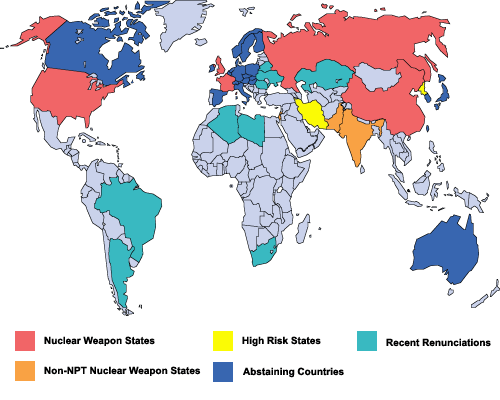President Obama is slowly putting Iran in a box. His cancellation of the useless and expensive so-called “missile shield” program in eastern Europe, which had needlessly antagonized Russia, has been rewarded with greater Russian cooperativeness on Iran. The US right wing accused Obama of a failure of nerve. But in fact his move was shrewd and gutsy, since he predisposed Russia to increased cooperation with the US in regard to Iran’s nuclear research program. Obama’s full court press for a United Nations Security Council resolution on nuclear disarmament also pulled the rug out from under Iran’s previous grandstanding tactics, whereby it accused the US and its allies of only wanting nuclear dominance, not the abolition of nukes.
Obama chaired the UN Security Council at the summit level on Thursday, and managed to get through an important resolution on nuclear disarmament.
United Nations Television has video:
The BBC notes that there are increasing fears that the Nuclear Non-Proliferation Treaty is breaking down. It was originally pitched as a bargain between the nuclear powers and the rest of the world, such that the countries with nukes would gradually get rid of them, while sharing expertise in nuclear energy-generation, while the other countries would agree not to acquire them.
Israel was the first non-European country to refuse to sign and then to go on to develop nuclear weapons by the early 1970s, with French and British help.
Last week, the International Atomic Energy Agency censured Israel for its estimated 200 warheads, acquiescing in a resolution introduced by Arab states. The vote was another sign, in the wake of the damning Goldstone report on Israeli atrocities in Gaza, that the international community is fast losing patience with unilateral Israeli policies.
In the 1990s, India and Pakistan got the bomb (India had done some low-yield test as early as the 1970s). More recently, North Korea has. Many countries have or seek what is called the “Japan option.” It is generally thought that Japan could construct a nuclear weapon very rapidly if it felt threatened enough. This emergency capacity is also thought to be sought by Iran, which denies that it currently has a weapons research program.
Russian President Dmitri Medvedov signalled on Thursday that his country could eventually support further UNSC sanctions on Iran if Tehran declines to be more transparent about its nuclear research program with the IAEA. His position appeared more open to increased sanctions than that expressed recently by Prime Minister Vladimir Putin, who is widely regarded as the de facto ruler of the Russian Federation.
Medvedev’s flexibility comes in the wake of the Obama administration’s cancellation of plans for missile shield installations in eastern Europe. Although both countries deny that there is any quid pro quo, it seems obvious that Obama’s good will gesture has yielded positive results in Moscow with regard to Iran policy.
Washington’s earlier push at the United Nations against the Iranian nuclear research program foundered when Iran charged hypocrisy on the part of the nuclear powers and insisted that its program is solely peaceful (an allegation that as far as US intelligence can tell is probably true). Obama’s stress on new nuclear disarmament agreements is in part intended to blunt any further Iranian diplomatic campaign and to put Iran in the position of looking obstreperous if it is not forthcoming in the upcoming negotiations with the 5 permanent UNSC members plus Germany.
UK Prime Minister Gordon Brown took a hard line position, urging further US sanction, according to ITN:
Brown erred in charging Iran with having a nuclear weapons program, which US intelligence can find no evidence for. But because it is using centrifuge technology that is open-ended and could be suitable for dual use, Western leaders such as Brown are suspicious that the program has weapons implications down the road.
China disagreed with Brown’s stance, and is opposed to further sanctions on Iran. But China has a doctrine of “Harmonious Development,” which prescribes that it stays out of the way of the other great powers and avoid political adventurism while it grows its economy. The Chinese might well be susceptible to US and UK pressure to move against Iran if the outcome of the forthcoming 5 + 1 talks is disappointing.
Meanwhile, Israeli Prime Minister Netanyahu’s appearance at the UN was decried by Israeli liberals as clownish. He seemed to take Iranian President Mahmoud Ahmadinejad’s bait by trying to offer documentary proof of the Holocaust (the event is not in doubt and doesn’t need to be proven) and then by referring to little Hamas in Gaza (pop. 1.5 mn.) as Nazis. Isn’t there a rule that if you make an analogy to the Nazis in your argument, you automatically lose? And since Israel declined to sign the Nuclear Non-Proliferation Treaty, has a couple hundred warheads, and has occasionally brandished them against other countries, Netanyahu altogether lacks credibility as a critic of Iran’s peaceful civilian nuclear research program.
Andrew Butters at at Time magazine explores the issue of whether making the Middle East a nuclear-free zone, as some have suggested, is a realistic goal. He concludes that it is more realistic than might be at first assumed.
End/ (Not Continued)




 © 2025 All Rights Reserved
© 2025 All Rights Reserved